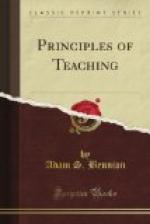3. To what extent is it that a born teacher teaches without method?
4. What is pedagogy?
5. Discuss the relative value of each of the five methods listed in this chapter.
6. Discuss the statement, “The best method is a variety of methods.”
HELPFUL REFERENCES
Betts, How to Teach Religion; Betts, The Recitation; Earhart, Types of Teaching; Bagley, Classroom Management; Strayer and Norsworthy, How to Teach.
CHAPTER XX
REVIEW AND PREVIEW
OUTLINE—CHAPTER XX
The need of review in
our Church teaching.—Review a real help
to
learning in that it
makes for: repetition, proper connection,
proper evaluation of
truth.
An intelligent review
is the result only of thorough preparation on
the part of the teacher.—Assignment
and preparation.—Ability to
make assignments a test
of good teaching.
Characteristics of a
good assignment: It is definite.—It
raises a
problem.—It
connects with the experience of pupils.—It
stimulates
to action.
General and specific assignments.—When to make assignments.
Each organization within the Church follows regularly its own course of study. At the beginning of the year it sets out upon a prescribed subject subdivided according to the number of meetings scheduled for the year’s work. As a result, no one lesson stands out independent of all others, but rather fits in naturally in a sequence of chapters each of which develops some aspects of one big subject. Because of such a plan the matters of review and preview take on vital significance. Each lesson should be made to link up naturally with what has already been presented and should point out by way of anticipation what is to follow. Many educators maintain that the ability to conduct a good review and to make an effective assignment are two of the surest tests of a good teacher.
The problem of review is really one of the most fundamental processes in education. It is the great key to learning. Anyone who has enjoyed the fun of teaching young children how to read has been impressed with the fact that the child has to be led to see and repeat the simplest words over and over again before they are really mastered. It is really astonishing how many times as simple a word as “ran” has to be repeated before the beginner in reading gets it fully into his consciousness. This very difficulty of teaching mere words or letters has led to the abandonment of the old “A-B-C” drill as the first step in reading, and the substitution for it of an indirect method wherein, through the laws of association, groups of words and sentences are mastered as the symbols which express concrete and objectified ideas. But by way of experiment, one of the most impressive experiences open to teachers is to take a child of four or five that has not been taught to read and attempt to drill into its consciousness a group of half a dozen words as simple as these: cat, fan, hat, get, man, jam. To the teacher who has attempted such an experiment no argument is necessary to prove the significance of review and repetition.




